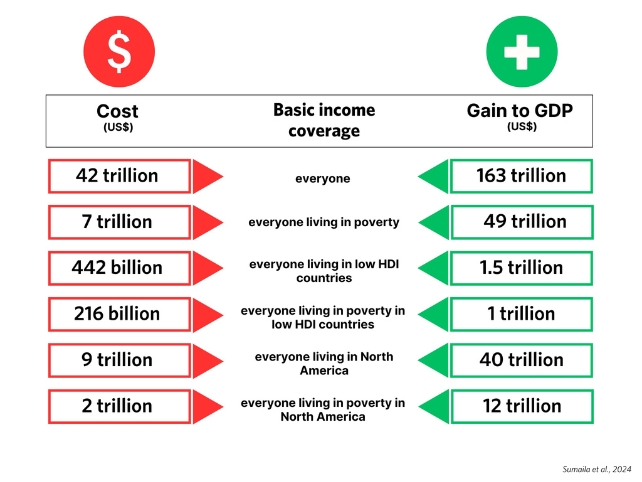Products You May Like
What if we could keep everyone out of poverty while also tackling the climate crisis? It sounds too good to be true, but it could be possible with a universal basic income scheme funded by taxing carbon emissions, a new study shows.
Universal basic income (UBI) proposes that a regular payment to every person – with no questions asked or any means testing – could replace all other forms of welfare payment, and perhaps make us all happier at the same time.
The new research, led by a team from the University of British Columbia in Canada, shows UBI could not only improve living standards but also boost global gross domestic product (GDP), a standard measure of economic prosperity.
The downside of UBI is that it costs an awful lot. According to the researchers, the companies that pollute the environment could pay for it because taxing carbon emissions alone would generate about US$2.3 trillion a year.
Environmental damage and poverty both pose huge risks to society,” says economist Ussif Rashid Sumaila from the University of British Columbia.
“By requiring that major polluters pay to clean up their own messes, or the ‘polluter pays principle‘, you have a creative approach to address both issues.”
Sumaila and his colleagues looked at data across 186 different countries, combining modeling with an analysis of economic factors such as marginal propensity to consume – how likely people are to spend their extra disposable income.
According to the team’s calculations, it would cost US$41 trillion to give a basic income to all of the 7.7 billion people on the planet, or US$442 billion to only help the 9.9 million people below the poverty line in developing countries.
Worldwide basic income would lead to a boost in global GDP of US$163 trillion or 130 percent, the researchers estimate. To put it another way, every dollar spent on UBI generates up to seven dollars in economic impact, as that money gets spent on food, rent, and other goods.
“Our findings show a positive economic-impact-to-cost ratio for basic income implementation across all scenarios examined,” Sumaila and team write in their published paper.

Previous research has linked similar schemes with environmental benefits too. The environmental tax would encourage more eco-friendly policies, the team suggests, although to be sustainable long term, it would need to transition to other funding sources.
Another potential benefit of UBI would be making communities more resilient. When a crisis comes – be it a natural disaster or a global pandemic – it wouldn’t be as disruptive or damaging if there was a safety net for people’s livelihoods.
“In short, extraordinary times call for commensurate measures,” says Sumaila.
So why isn’t UBI in place already? It would require a lot of political will and agreement, and there remain questions over the extent to which it would deincentivize work and innovation, on top of the concerns over how it would be funded.
“To lower the huge barrier imposed by implementation costs, we suggest a diverse array of strategies aimed at financing basic income,” the authors argue.
“We suggest that basic income implementation is feasible and could be a potent tool in addressing the twin challenges of decreasing worldwide poverty while reducing environmental degradation.”
The research has been published in Cell Reports Sustainability.
